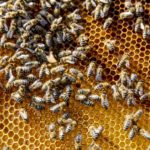“Without bees, we could not feed the human population; billions would starve”.
Before the coronavirus outbreak began late last year, scientists had been warning of the likelihood of a global pandemic for decades.
A number of experts across the world had predicted that it was not a case of if – but when – a new debilitating disease would sweep the planet, and that we were greatly underprepared.
And while it is now obvious that the risk of a pandemic and its global impact was severely underestimated, it far from the only biological risk that we have been ignoring.
Biodiversity, and the threat to the population of bees in particular, may not seem the most pressing issue on the horizon amidst a global crisis.
However, the importance of bees to both the environment and our economy is more important than many people realise, and their populations are under threat.
Bees are vital to our way of life because they pollinate food crops, fertilising plants so that they can produce fruit, vegetables, seeds.
According to the Bumblebee Conservation Trust, pollination is worth £691 million to the UK economy.
“Insect pollinators are essential for food production,” Gill Perkins, CEO of Bumblebee Conservation Trust told The Independent.
Bees and other insect pollinators together pollinate 87 per cent of all plant species, and about 75 per cent of crop species, without bees it has been estimated that supermarkets may have half the amount of fruit and vegetables.
The extinction of bees could lead to a significant disruption in our food supply chains, drive up the price of fresh produce, and likely cause famine in poorer regions, according to a number of wildlife organisations.
“Without them, we would have no apples, tomatoes, strawberries, peppers, cherries, chocolate, coffee, and much much more. We could not feed the human population; billions would starve,” Dave Goulson, Professor of biology at the University of Sussex specialising in the ecology and conservation of insects, said in an interview.
Their decline or extinction would also have a knock-on effect on the makeup of our ecosystems, as bees contribute significantly to the pollination of wildflowers that provide the basis of many food chains.
“Numerous flowering plants would disappear from natural ecosystems, leading to a collapse of biodiversity with further dire consequences for planetary health,” Prof Goulson added.
Importantly, there are three different types of bees in the UK including bumblebees, solitary bees, honey bees, alongside over 280 bee species in total, which are all important pollinators.
According to a report by World Wide Fund in 2019, 17 species of bees had become regionally extinct in the UK, with 25 other types marked as threatened and another 31 of conservation concern.
Further afield, twelve wild bee species within Europe are classified by the International Union for Conservation of Nature as critically endangered. A further 52 are listed as endangered.
Their populations are threatened by a number of factors including habitat loss due to agriculture and farming, urban and suburban development, pesticides, climate change, and disease.
And while the climate crisis has drawn more mainstream attention in the last few years, experts urge that acknowledging threats to biodiversity, that are often easily overlooked, is just as important.
“Loss of biodiversity is as big a threat to our future as climate change, but gets much less attention, perhaps because the benefits we get from biodiversity, though vast, are largely hidden to us in our everyday, urban lives,” Prof Goulson said.
Ms Perkins echoed the sentiment that while “climate change is rightly front and centre of many people’s minds” it is “vitally important that we address biodiversity challenges such as habitat loss and the role of invasive species.”
To assist in the protection of bees and their habitats, anyone can take action to help prevent the decline of their populations.
Steph Green, a home bee-keeper in Essex who picked up the hobby after being inspired by her father, says that actively doing something to maintain populations of honey bees is multifaceted and rewarding.
“Beekeepers look after the health and well being of the colony of bees in the same way as a farmer would look after his sheep”, she said. “A good beekeeper can ‘read the bees’ which means being attuned to their needs and anticipating problems or needs that will arise. It is a craft.”
After around six years of keeping hives, Ms Green said the commitment to bee-keeping may not be suited for everyone. “Looking after bees isn’t to be taken lightly,” she advised. “There is a time commitment also and a responsibility to the public,” she said.
However, experts encourage that there are lots of small steps everyone can take to protect bee populations such as refraining from using pesticides on gardens, cutting grass less often, and planting more nectar-rich flowers, shrubs, and trees.
Ben Keywood, Entomologist at Sheffield & Rotherham Wildlife Trust, said that “as individuals, we can all help by avoiding the use of chemicals in our gardens” and “leave more of our gardens blooming rather than turning them into decking or parking areas.”
“As a species, we have started to think of ourselves as outside of nature rather than a part of it and yet it is vital to our health and wellbeing,” he added.
Ultimately, experts have warned that risks and impacts of depleting biodiversity, climate change and disease all go hand in hand and that in light of the coronavirus pandemic, the world needs to evaluate the impact it is having on the planet and its environment.
A number of the world’s leading biodiversity experts warned in an article published on Monday that “rampant deforestation, uncontrolled expansion of agriculture, intensive farming, mining and infrastructure development, as well as the exploitation of wild species have created a ‘perfect storm’ for the spillover of diseases.”
“We have a small window of opportunity, in overcoming the challenges of the current crisis, to avoid sowing the seeds of future ones,” they said.


